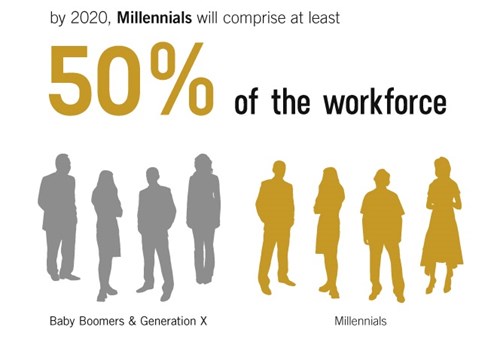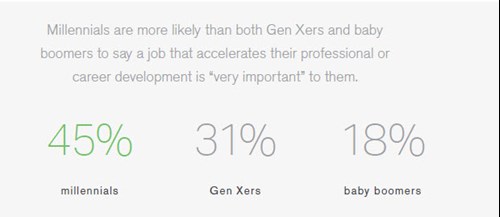Sunday, October 01 2017
Millennials are set to be 50% of the workforce by 2020 and 75% of the workforce in 2030. This group is loosely defined as those born after 1982 but before 2004, and is comprised of two distinct groups--Gen Y and Gen Z.
According to the most recent data from the Bureau of Labor Statistics, 390,000 manufacturing jobs currently sit unfilled with an estimated 2.5 million manufacturing jobs going unfilled in the next ten years. Clearly, there is a disparity between what employers want and what the applicant pool has to offer. Some blame the skills gap, some point to a wage issue, while others might argue it’s because manufacturing has a negative (and incorrect) image as the dirty, dangerous job it once was. Perhaps the 2008 economic downturn brings the industry’s security and stability into question. Whatever it is, one thing is clear: manufacturing NEEDS the next generation of workers to join their teams.
Our need to attract millennials talent is driven by more than just labor necessity, millennials make awesome contributors, they’re technology-savvy, and they genuinely care about both their communities and the missions with which they align themselves.
"We struggle to find talent," said Batesville Tool and Die HR Manager Carla Enzinger.
This is not an isolated problem, according to early findings from the Katz Sapper and Miller’s 2017 Indiana Manufacturing Survey, 87% of manufacturers responded that they have problems recruiting young people into manufacturing.
"So we have begun looking for different approaches to attracting talent to our company," stated Enzinger.
Among these new approaches at Batesville Tool and Die: a co-op program specifically targeting local high school and community college students, wi-fi access throughout the plant, a walking track, greater emphasis on technology, and a college incentive program, among others.
More and more, people recognize the need for millennials (and younger generations) in manufacturing. However, this recognition often comes with concerns of the perceived difficulties associated with hiring millennials—expectations of advancement, entitlement, work ethic, and difficulty communicating. These notions and the lack of attempt to understand this generation will do the exact opposite of the intended: it will push the generation further away from manufacturing. Instead of expecting this generation to change, employers should make an effort to figure out how millennials work differently and weave those differences into the workplace. As with any set of differences, finding compromises is the key to success.
What Millennials Value in the Workplace
Here’s the problem, manufacturing is competing for the same talent pool as every other industry. This is no longer an employer’s market; the labor supply is not plentiful. Fewer available workers, coupled with higher productivity will translate into higher wages and an employee’s market. Employers have to establish a culture and benefits that millennials want if they want to compete for those resources. So, great, millennials want ping pong tables and kegs at work, right? Wrong. The benefits and perks that employees truly care about are those that offer them greater flexibility, autonomy, and the ability to lead a better life, according to Gallup’s State of the American Workplace. Gallup indicates millennials want benefits much like other generations do: things closely related to quality of life such as good health insurance, paid vacation, and retirement plans. Where millennials differ from their predecessors is in just how much they value these things, as this generation is often willing to change jobs just for a specific benefit.
“The differences are most evident for items related to children, development, education, and flexibility,” the survey found.
What does all this mean for employers? They need to create a culture that addresses what millennials seek in a job. So, it would benefit us to get some insight into the way millennials think about work and the expectations they have.
They want their work to have purpose. They are passionate about making a difference through their work. Volunteering is also a top priority for this group.
They want to learn and develop. They expect their roles to be continually challenging and ever-changing.

Source: Gallup
"Millennials want to learn and take in information at a quick pace. Our goal is to challenge them,"
- Carla Enzinger, Batesville Tool & Die
They want stability. The survey found that the more stable they view an organization, the more likely they may be to see a future with that company. Poised for growth? Great! Emplify’s Q3 Employee Engagement Trends and Indexes report showed a high positive correlation with higher growth orgs and employee engagement. They want to be a part of something, remember?
They want ongoing feedback. They want to talk to their managers, often. They want collaborative goal-setting, gone are the old days of high power distance. . Only about 1 in 5 employees strongly agree that their performance is being managed in a way that motivates them to do outstanding work (Gallup).
They want flexibility in when and where they work. They want work-life balance. The 9 to 5 is dead, as millennials search for jobs that fit into their lives. Work doesn’t end when they leave the office, and life doesn’t end when they step foot into it. A Gallup study on benefits and perks found that 51% of employees would switch to a job that allows flex-time, and 37% would switch for the ability to work off-site part of the time. This is especially hard to accommodate given the nature of manufacturing.
“Manufacturing companies are going to have to figure out how to staff their operations while allowing the same work schedule flexibility offered by IT/Software companies”
- Joe McMurry, Leadership expert at Purdue MEP
They are connected. They do not USE technology, it is an integral part of their daily lives and the way they interact with the world. Having grown up with technology, they could be a great advantage to employers by realizing new and unique ways of approaching and utilizing technology.
Next Steps
Manufacturing leaders must adapt to trends and demands of the current workforce or they will find themselves struggling to attract and keep great employees, and therefore customers.
“Here’s my short answer as to how to transform your culture: commit to transforming your workplace from old command-and-control to one of high development and ongoing coaching conversations”
- Jim Clifton, Chairman and CEO, Gallup


